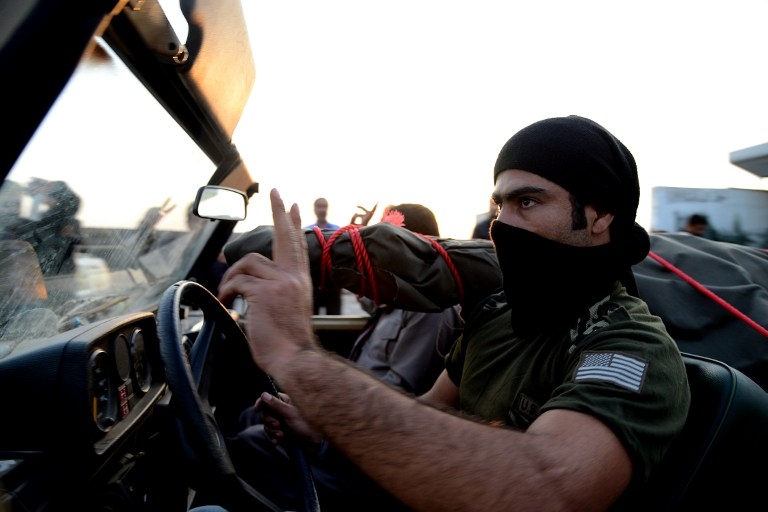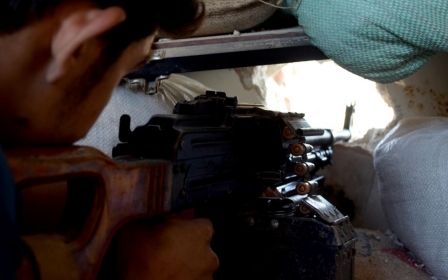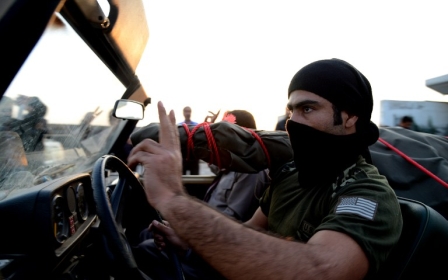Kurdish peshmerga forces enter Syria's Kobani after further air strikes

A convoy of Iraqi Kurdish forces streamed across the Syrian border from Turkey late Friday to help Syrian Kurds defend the key border town of Kobane which is under assault by Islamic State group jihadists.
Horns blaring, the trucks carried some 150 Iraqi Kurdish fighters, known as peshmerga or "those who defy death", many of them chanting "Kobane" and waving to jubilant crowds who cheered them across the border where they will join the fight against the jihadists.
US-led air strikes hit Islamic State positions around Kobani earlier in the day in an apparent effort to pave the way for the heavily-armed Kurdish contingent to enter.
Driving out of a heavily guarded Turkish military warehouse around 8 km (5 miles) from the frontier, the peshmerga stood atop their pick-ups, waving to onlookers and brandishing their rifles in the air. Turkish police lined the road holding anti-riot shields.
Fuel in preparation
Despite having limited strategic significance, Kobani has become a powerful international symbol in the battle against the hardline Sunni Muslim insurgents who have captured large expanses of Iraq and Syria and declared an Islamic "caliphate".
Turkish President Recep Tayyip Erdogan took aim at Western leaders for focusing too much on the battle for Kobane, neglecting the ongoing struggle in the rest of Syria to overthrow president Bashar al-Asad.
Speaking to reporters in Paris after meeting French President Francois Hollande, Erdogan asked: "Why are coalition forces continually bombing this town of Kobane?"
“Why [do we focus on] Kobane but not Idlib, Hama, Homs, or Iraq, 40% of which is under occupation? Why is no action being taken or no operations being conducted for these places but Kobane?”
Erdogan, who has proposed “safe havens” and no-fly zones in northern Syria, repeated his argument after his meeting with Hollande.
"We talk about nothing other than Kobane which is on the Turkish border and where there is no one left any more except 2,000 people fighting."
French President Hollande nodded in agreement and told reporters that the “key town” in the struggle is Aleppo, Syria’s largest city, which has been divided between the regime and insurgents since July 2012.
Strikes intensify
Ankara's decision to permit heavily armed Iraqi peshmerga forces and opposition rebels to cross its border into Syria has sparked condemnation from Damascus, which denounced it as a "flagrant violation of Syrian sovereignty".
The US-led coalition carrying out air raids against IS in both Syria and Iraq has intensified attacks around Kobane.
The Britain-based Observatory reported fierce fighting in central Kobane on Friday.
"Kurdish fighters were able to advance towards an IS position in the north of the town after an operation that killed dozens of jihadists," it said.
The Observatory said Kurdish People's Protection Units (YPG) made advances into the town's central square.
"The jihadists responded by blowing up a booby-trapped vehicle in the square next to the Kurdish positions."
The Observatory also reported that artillery pieces were destroyed and IS fighters killed as coalition air strikes targeted the north and centre of Kobane.
Foreign flock to fight
According to experts and extracts of a UN report published by Britain's Guardian newspaper, IS is now recruiting foreign jihadists on an "unprecedented scale".
The latest US figures show that around 1,000 foreign fighters are flocking to fight in Iraq and Syria every month.
In Iraq, government forces Friday attacked the strategic jihadist-held town of Baiji, which has been out of Baghdad's control for months, regaining control of two areas, army officers said.
Baiji lies on the main highway to Iraq's IS-controlled second city Mosul, and its recapture would also help to further isolate militants in the city of Tikrit, to the south.
Iraq's leading Shiite cleric, Grand Ayatollah Ali al-Sistani, meanwhile, urged those battling IS to protect civilians in Sunni battle zones.
"It is up to you to protect the lives of the innocent citizens and protect their property... whatever confession they may belong to," he said.
Sistani, who is revered by millions, has enormous influence among Iraq's Shiite majority.
New MEE newsletter: Jerusalem Dispatch
Sign up to get the latest insights and analysis on Israel-Palestine, alongside Turkey Unpacked and other MEE newsletters
Middle East Eye delivers independent and unrivalled coverage and analysis of the Middle East, North Africa and beyond. To learn more about republishing this content and the associated fees, please fill out this form. More about MEE can be found here.




